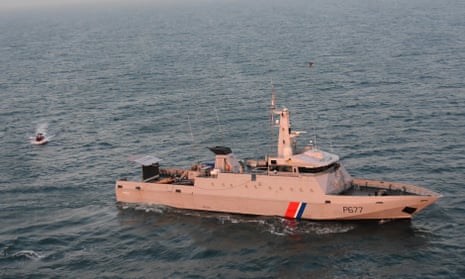Four people, including two children aged five and eight, have died attempting to reach Britain by boat across the Channel, French authorities have confirmed.
One man drowned when the migrant boat sank, and three people died after they were pulled from the water alive with 15 others, said the official from the Nord department. Another person, possibly a child, is still missing.
Some of those rescued had gone into cardiac arrest, and others suffered hypothermia.
The group’s small fishing boat capsized in the Channel at about 9.30am, the official, Hervé Tourmente, told journalists earlier in Loon-Plage, near Dunkirk.
“It seems that one person, who might be an infant, is still missing,” Tourmente said, noting that stormy conditions had made the attempted crossing especially perilous.
Military resources as well as civilian boats were involved in the rescue operation after the vessel was seen to be in difficulty near Dunkirk.
An English yachtsman reportedly raised the alarm, sparking a large search and rescue operation from the French coast, involving six boats and three aircraft, that lasted well into the afternoon.
French patrol boats and a helicopter from the Belgian air force, as well as a fishing boat, were also dispatched. An investigation has been launched by the Dunkirk public prosecutor.
Tourmente said the boat was carrying Iranian migrants including men, women and children. The aim was to “recover as many people as possible”, he said.
The UK home secretary, Priti Patel, said: “I’m truly saddened to learn of the tragic loss of life in French waters this morning. My thoughts and prayers are with their families and loved ones at this time.”
Patel said the UK was in touch with its French counterparts, who were leading on the response, and have offered support.
“This tragic news highlights the dangers that come with crossing the Channel and I will do everything I can to stop callous criminals exploiting vulnerable people,” she added.
Boris Johnson also expressed his sympathy for those who had lost loved ones. The prime minister tweeted: “We have offered the French authorities every support as they investigate this terrible incident.”
More than 7,400 people have arrived in the UK in small boats this year, according to analysis by PA Media, nearly four times as many as in 2019, with a record 416 arriving on a single day on 2 September.
Official data shows that in the year to June 2020, there were 3,402 applications for asylum from children aged 17 or under, of which 2,789 were from unaccompanied asylum-seeking children.
The government last week rejected an amendment to its immigration bill that aims to ensure one of the few remaining safe and legal routes for children to travel to the UK to seek asylum remains open.
Put forward by the former child refugee Lord Dubs, the clause aims to ensure that rights under UK law to family reunion, at present covered by EU legislation known as the Dublin III treaty, will continue after the Brexit transition period.
Another route, which was introduced after an earlier amendment put forward by Dubs was accepted by the government and required the Home Office to accept an unspecified number of unaccompanied child refugees from Europe for resettlement in the UK, was effectively closed by ministers who set an arbitrary cap on the numbers.
Ellen Ackroyd, a field manager for the aid organisation Help Refugees/Choose Love, based in Calais, said: “In Calais, these people face daily violent evictions from their makeshift shelters and there is a total lack of information about their legal rights.
“At the same time, people seeking protection in the UK can only do so once on UK soil yet no safe and legal routes are made available for this purpose.
“So long as the hostile and exclusionary treatment of people seeking protection continues, people will continue to attempt these dangerous journeys, which no one should ever have to undertake.”
Beth Gardiner-Smith, the chief executive of Safe Passage, one of a number of humanitarian groups that have long called for safe and legal routes for asylum seekers, said: “Nobody should have to risk their life to reach safety and today’s tragic news is the direct consequence of a lack of safe alternatives for those seeking sanctuary.
“Just this year, the government closed the Dubs route designed to give children safe passage to the UK. And now the only legal route left available to children – family reunion – will end in less than 10 weeks’ time unless the government acts now.
“Rather than speculating about ever more inhumane ways to push back and prevent refugees seeking asylum, the government should act now to protect family reunion and expand safe and legal routes for refugees.”
Mariam Kemple Hardy, the head of campaigns at Refugee Action, said: “No one wants to see people make dangerous crossings but the government’s hostile rhetoric does nothing to help. It must stop trying to look tough and urgently create more safe and legal routes for people to seek sanctuary in the UK.”
